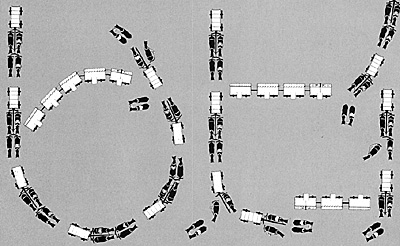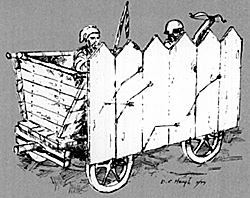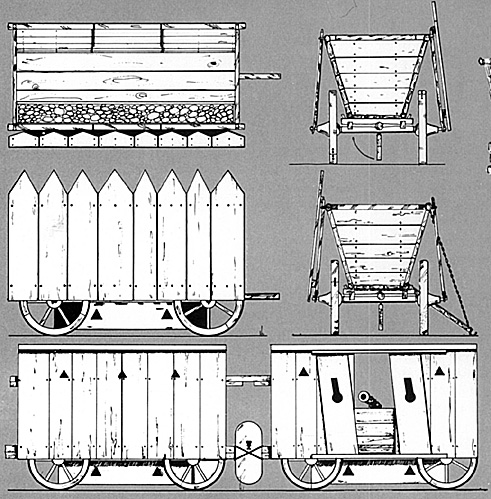Tactics
Unable to field heavy cavalry to oppose their enemies on equal terms, the Hussites developed wagon forts out of necessity. War wagon tactics evolved simultaneously with the improvements in the wagons themselves. A simple circle (left) expanded into more complicated squares and triangles formed by parallel columns {right}, based upon an organization using the "rota" -- a unit of approximately 100 men (5 wagons). Zizka's demand for discipline and constant training enabled the Hussites to become so skillful with the war wagons that they could form theirfort in the midst of the enemy!
War wagons were not unique, the Goths had used them in 378 A.D. to defeat the Romans at Adrianople, but Zizka refined them to their most sophisticated level in the five years he led the Hussite field armies. The wagon forts, once positioned on favorable terrain in mutually-supporting positions-with catapults, bombards, and light cavalry to buttress the battle line-proved impregnable to the undisciplined Royalist cavalrJ, and infantry for over fifteen years.

War Wagons
Originally the war wagons were only peasant carts modified with wooden boards to give added protection. By the end of the wars the wagons had evolved intc, large assault vehicles pulled by 4-8 oxen or horses. The bottom drawingsshow such wagons {including firing ports) with an early gun "snake") mounted on one of them-the first self- propelled artillery in history. A typical crew of 18-20 employed half as handgun-armed musketeers and crossbow archers in the wagon, while the remainder fought as pikemen from the spaces between the war wagons.


More Hussite Wars
-
Hussite Wars: Introduction
Hussite Wars: Jan Zizka: The Man
Hussite Wars: Papal Schism and John Huss
Hussite Wars: The Land
Hussite Wars: Operations to February 1421 Armistice
Hussite Wars: Operations 1421
Hussite Wars: Operations 1422
Hussite Wars: Operations 1423
Hussite Wars: Operations 1424 and After
Hussite Wars: Hussite Wagon Fort Tactics
Hussite Wars: Medieval Weapons
Hussite Wars: Soldiers
Hussite Wars: Jan Zizka: The Military Leader
Hussite Wars: Large Map of Bohemia/Moravia (slow: 175K)
Hussite Wars: Jumbo Map of Bohemia/Moravia (extremely slow: 504K)
Hussite Wars: Time Line
Back to Conflict Historical Study 1 Table of Contents
Back to Conflict List of Issues
Back to MagWeb Master Magazine List
© Copyright 1974 by Dana Lombardy
This article appears in MagWeb (Magazine Web) on the Internet World Wide Web.
Other military history articles and gaming articles are available at http://www.magweb.com